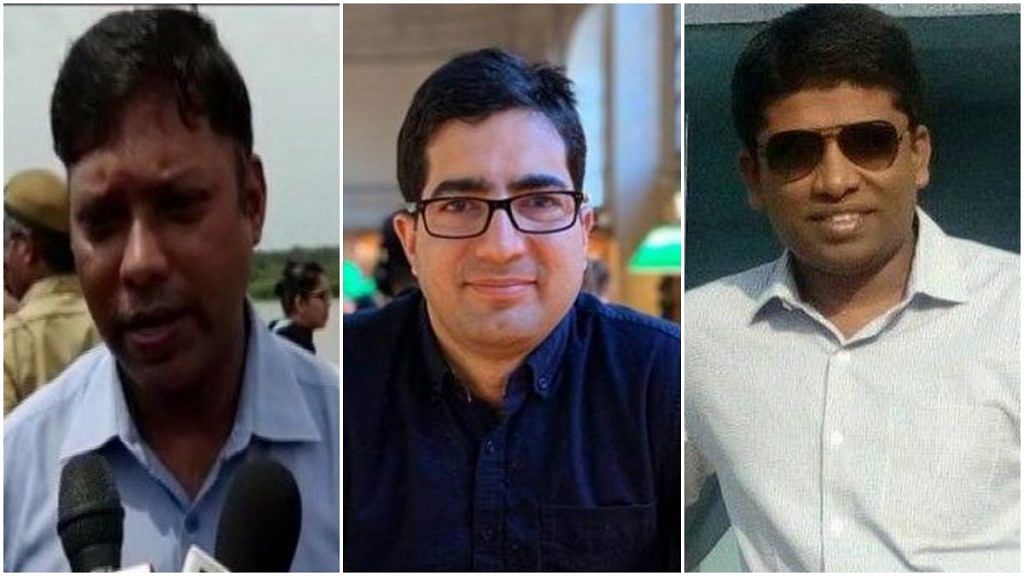New Delhi: The Modi government has not accepted the resignations of three disgruntled officers who controversially quit the premier Indian Administrative Service (IAS) in the last 10 months over disagreements with the actions of the government.
This includes Shah Faesal, an IAS officer of the erstwhile Jammu & Kashmir cadre who resigned in January to float a political party, multiple sources told ThePrint.
The others are Kannan Gopinathan, a 2012-batch IAS officer of the AGMUT cadre who resigned on 23 August, and S. Sasikanth Senthil, a 2006-batch officer of the Karnataka cadre who put in his papers on 6 September.
Faesal now leads the J&K People’s Party. He has been in detention under the Public Safety Act (PSA) since August, when the Modi government scrapped Article 370 and stripped the erstwhile J&K state of its special status.
“It has been over 10 months, and Faesal’s resignation has not been accepted by the government… He is technically an employee of the Indian government even though he is a politician now,” said an IAS officer of the erstwhile Jammu and Kashmir cadre.
“It does not make sense to not relieve someone of government service who has been arrested under the PSA.”
An official from the Department of Personnel and Training (DoPT) confirmed that Faesal’s resignation had not been accepted, and was still “under process”.
“There is nothing abnormal about this,” the official said. “The government can take time to process resignations since there are vigilance and other kinds of processes that need to be followed.
“This is not specific to this case,” the official added.
ThePrint sent a query regarding the status of Faesal’s resignation to the DoPT spokesperson, but there was no response.
While there is no fixed timeline within which the government is bound to accept resignations, civil servants say a central notification can be issued in a month’s time if the administration so wishes.
Guidelines on the procedure to be followed in case an officer wishes to resign say: “It is not in the interest of government to retain an unwilling member of service. The general rule, therefore, is that a resignation of a member from service should be accepted.”
Also Read: IAS resignations: Are civil services losing their charm in Modi era?
‘Pressure tactic’
While Faesal resigned to protest against “unabated killings in Kashmir” and the “marginalisation of Indian Muslims at the hands of Hindutva forces”, Gopinathan and Senthil cited disillusionment with the state of the Indian democracy.
Faesal and Gopinathan both face disciplinary inquiries for alleged violation of conduct rules, with the latter accused of “dereliction of duty” for not reporting to work since 26 August.
Civil servants ThePrint spoke to said delaying resignation acceptance was often a “tactic” the government employs to punish or harass officers it finds problematic.
“When they want, the Centre accepts the resignation immediately, but when it wants to harass someone, they adopt these tactics,” said an IAS officer.
“In Aparajita Sarangi’s case, for example, the Centre issued a no-objection to her resignation within days.”
Sarangi, a former IAS officer of the Odisha cadre, resigned from the IAS last year to join the BJP, and won the Lok Sabha election this year from Bhubaneswar.
The resignation of O.P. Choudhary, an officer of the 2005 batch who also quit the IAS last year to join the BJP, was accepted within a week. He formally joined the party just days after leaving the IAS.
IAS officers said even though taking four-five months to process the resignation of officers is “normal”, the government is likely to sit on the resignations of Gopinathan and Senthil considering the controversies they sparked.
While Gopinathan has publicly expressed his disillusionment with the government on its actions in Kashmir, Senthil just said “it was unethical for him to continue as a civil servant in the government when the fundamental building blocks of our diverse democracy are being compromised in an unprecedented manner”.
ThePrint reported in September that the string of recent resignations had forced the central government to look at toughening the conditions for quitting the civil services.
Also Read: IAS fraternity divided over officers’ resignations, some call them early ‘warning signs’
